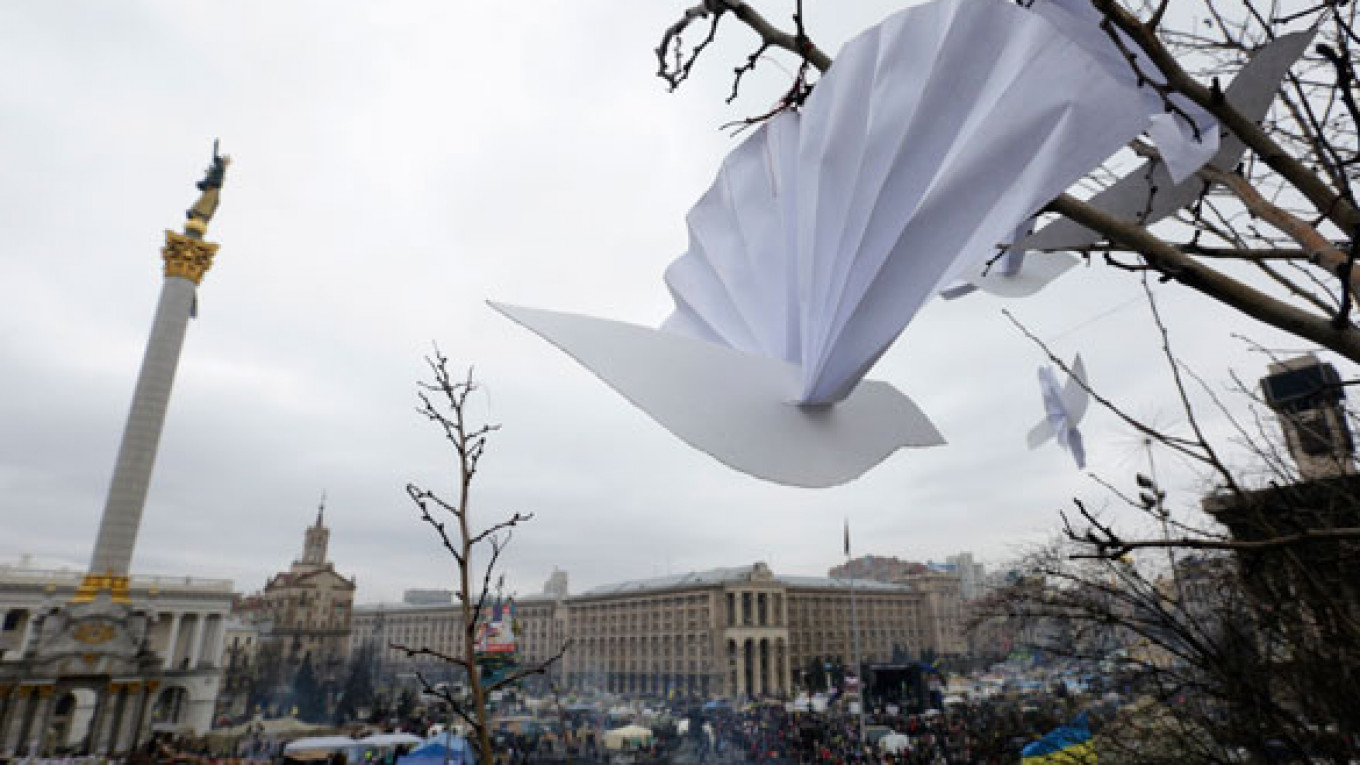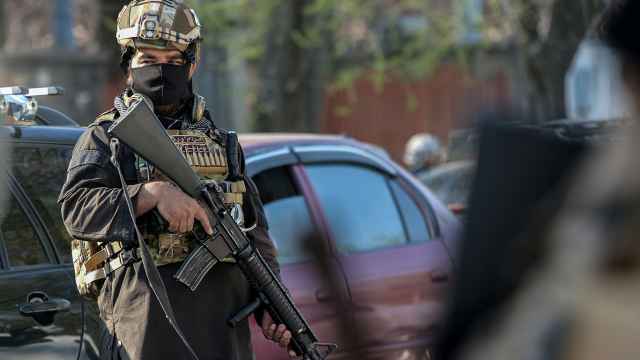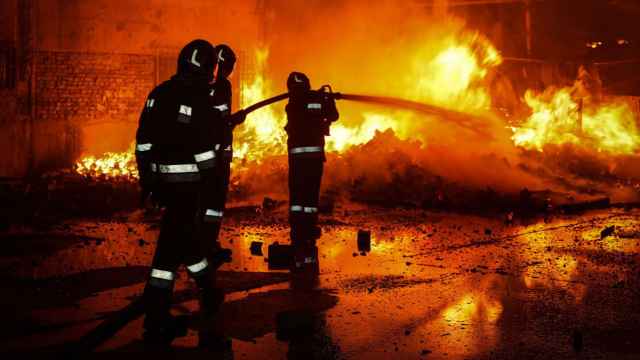Russia's Foreign Ministry on Wednesday warned of growing extremism in Ukraine, and President Vladimir Putin ordered the Defense Ministry to conduct military preparedness drills in the western military district bordering Ukraine.
Stirring fears of a possible invasion, Defense Minister Sergei Shoigu said that the armed forces in that area were already "combat ready," Interfax reported.
The order from Putin — which Shoigu later said was in no way connected with the situation in Ukraine — came as tensions grew in Ukraine's autonomous republic of Crimea, with pro-Russian demonstrators engaging in a standoff with pro-Ukrainian ones in front of the Supreme Council building in the capital, Simferopol.
Russia watchers have anxiously been waiting to see what Putin's next move might be amid growing uncertainty over Ukraine's future. The official response so far has been mostly limited to Foreign Minister Sergei Lavrov's criticism of the West's "meddling" in Ukraine and warnings of extremists among Kiev's new leadership.
On Wednesday, Lavrov said that any cooperation with Ukraine was only possible if requested by "legitimate authorities," reiterating Russia's refusal to recognize the new Ukrainian government and denouncing Yanukovych's ouster as an illegitimate coup.
At a meeting with Lamberto Zannier, general secretary of the Organization for Security and Cooperation in Europe, Lavrov urged the OSCE to condemn nationalist sentiment in Ukraine and the recent legislative move to downgrade the status of the Russian language.
Russia's Foreign Ministry echoed Lavrov's remarks in a statement released Wednesday.
"Russia is concerned with the atrocities committed by Ukrainian extremists, who, convinced of their license and impunity, continue to impose their will [on the population]," the ministry said.
The ministry said some of the "extremists" had threatened priests from the Russian Orthodox Church in Ukraine and attempted to seize its Kiev Pechersk and Pochayevskaya monasteries. Ukraine's Foreign Ministry dismissed the claims as untrue and said they lacked any factual evidence.
Despite Russia's repeated statements urging noninterference in Ukraine, former Ukrainian presidents Leonid Kravchuk, Leonid Kuchma and Viktor Yushchenko lashed out at Russia on Wednesday for failing to practice what it was preaching.
"Russia, which has always labeled our foreign partners' attempts to deal with the situation through political means as interference, has now itself interfered in Ukraine's political life," they said.
They did not elaborate on which measures they were referring to.
In another move that caused fears of a Russian invasion, roadblocks were set up on Wednesday on all roads leading to Sevastopol to prevent representatives of the new government from coming to the city. Sevastopol, which hosts a Russian naval base, is located on the Crimean peninsula but constitutes a Ukrainian administrative entity that is separate from the republic of Crimea.
Crimea, a mostly Russian-speaking area, has become a bone of contention in recent days between the Kremlin and the Ukrainian nationalist government that came to power after pro-Russian President Viktor Yanukovych was overthrown last week. Crimea, which used to be ruled by Crimean Tatars and Turks, was seized by Russia in the 18th century and was only ceded to Ukraine in 1954.
Several hundred pro-Moscow demonstrators came to the Supreme Council on Wednesday and hoisted a Russian flag on top of the building, demanding that the legislature take steps to proclaim Crimea's independence and refuse to recognize the new national government.
They were opposed by thousands of pro-Kiev protesters, however, who urged the Supreme Council to cancel its session. The number of pro-Kiev demonstrators was estimated at between 6,000 and 20,000, according to various sources.
The pro-Russian protesters shouted "Russia!," while their opponents, many of them Crimean Tatars, chanted "Ukraine!," "Down with the gang!," "Ukraine is not Russia!" and "Putin is a dictator!," according to a live broadcast on Espresso.tv.
Echoing the Arab Spring, some of the Muslim Crimean Tatars on Wednesday shouted “Allahu akbar!” and “Tahrir!”, the name of the Cairo square where two revolutions took place in recent years.
After initially refraining from any physical altercation, the two sides eventually came to blows, with protesters throwing stones and fireworks. The pro-Russian protesters were squeezed out of the area, and the pro-Kiev demonstrators briefly entered the legislature's building.
The Associated Press later reported that at least 20 people were injured in the scuffles.
The tensions subsided when the Supreme Council's session was canceled, and protest leaders called on the crowd to go home, urging all ethnicities to cooperate peacefully with each other.
The issue of Crimea's independence, which pro-Russian politicians intended to consider during the legislature's session, was dismissed by some analysts as spurious.
Political analyst Vitali Bala, head of Ukraine's Situation Modeling Agency, said by phone that there were no "objective conditions" for Crimea's separation from Ukraine and that there were international guarantees of the country's territorial integrity.
Some have compared the situation in Crimea to that in Georgia's breakaway republic of South Ossetia in 2008, when Russia waged a brief war over its status with Georgia and formally recognized the republic's independence.
According to Bala, however, South Ossetia became independent only after a war, and no war has yet taken place in Crimea. Even the possibility of war is highly unlikely, he said.
Alexei Makarkin, a deputy head of Russia's Center for Political Technologies, echoed that sentiment.
A Russian invasion of Ukraine is highly unlikely, Makarkin said, because if Russia violates Ukraine's sovereignty, it will be isolated internationally.
Instead, Russia will likely just demonstrate its military force by holding exercises, lend political support to Crimea and appeal to the international community, he said.
Russia has already attempted to maintain control of the situation in the Crimea by sending lawmakers there.
A delegation of Russia's Federation Council is due to arrive in Crimea on Friday, said Leonid Slutsky, chairman of the State Duma's committee for relations with former Soviet countries.
The new Ukrainian authorities may interpret the Russian delegation's visit as an effort to fuel separatist sentiment, he said, adding that they would try to suppress such sentiment.
"If there are elements of a violent conflict, and if the life and health of our fellow Russians is at risk, we will step in," Slutsky said.
Contact the author at o.sukhov@imedia.ru
A Message from The Moscow Times:
Dear readers,
We are facing unprecedented challenges. Russia's Prosecutor General's Office has designated The Moscow Times as an "undesirable" organization, criminalizing our work and putting our staff at risk of prosecution. This follows our earlier unjust labeling as a "foreign agent."
These actions are direct attempts to silence independent journalism in Russia. The authorities claim our work "discredits the decisions of the Russian leadership." We see things differently: we strive to provide accurate, unbiased reporting on Russia.
We, the journalists of The Moscow Times, refuse to be silenced. But to continue our work, we need your help.
Your support, no matter how small, makes a world of difference. If you can, please support us monthly starting from just $2. It's quick to set up, and every contribution makes a significant impact.
By supporting The Moscow Times, you're defending open, independent journalism in the face of repression. Thank you for standing with us.
Remind me later.






